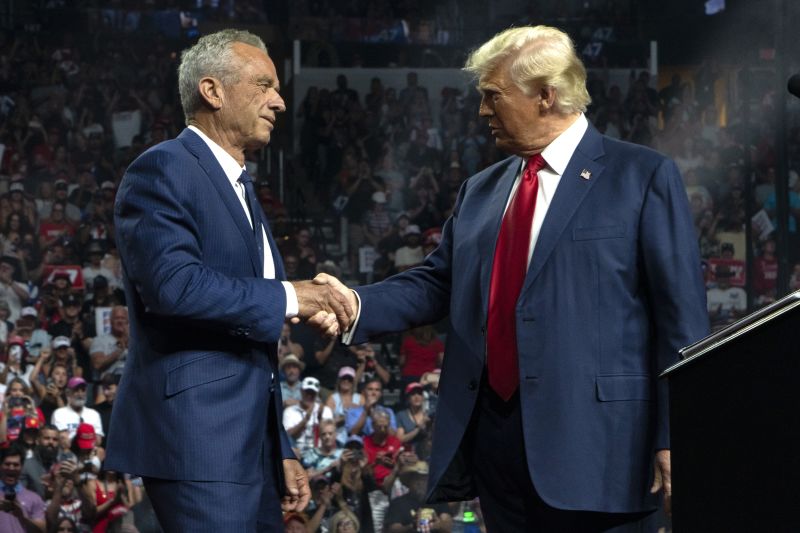President Donald Trump’s pick of Robert F. Kennedy Jr. for secretary of the US Department of Health and Human Services “is an extraordinarily bad choice for the health of the American people,” Dr. Ashish Jha, dean of the Brown University School of Public Health, warned Thursday.
“I was worried we could go low but not this low,” Dr. Carlos del Rio, executive associate dean of the Emory School of Medicine & Grady Health System, wrote of the pick.
Although Trump signaled in the runup to the election that he planned to let the vaccine skeptic “go wild” on health, food and medicine, Kennedy’s official selection for the nation’s top health post sent shockwaves through the public health world, concerned about his potential effects on vaccination rates, research on infectious diseases and misrepresentation of established science.
“For too long, Americans have been crushed by the industrial food complex and drug companies who have engaged in deception, misinformation, and disinformation when it comes to Public Health,” Trump said in a statement Thursday. “The Safety and Health of all Americans is the most important role of any Administration, and HHS will play a big role in helping ensure that everybody will be protected from harmful chemicals, pollutants, pesticides, pharmaceutical products, and food additives that have contributed to the overwhelming Health Crisis in this Country.”
Advocates for public health did not mince words with their criticism.
“Robert F. Kennedy, Jr. is a clear and present danger to the nation’s health. He shouldn’t be allowed in the building at the Department of Health and Human Services (HHS), let alone be placed in charge of the nation’s public health agency,” Robert Weissman, co-president of the consumer advocacy nonprofit Public Citizen, said in a statement. “Donald Trump’s bungling of public health policy during the Covid pandemic cost hundreds of thousands of lives. By appointing Kennedy as his Secretary of HHS, Trump is courting another, policy-driven public health catastrophe.”
“Everything that we see and know about what a Trump administration would look like would devastate public health in this country,” said Osterholm, who noted that he’d served in a health policy role in every presidential administration since Ronald Reagan’s and thinks of himself as a “nonpartisan public health soldier.”
But even some skeptics acknowledged that they agree with parts of Kennedy’s ideas, including around fixing the food system.
Here are some of the areas where Kennedy has said he’s planning to make change.
‘Cleaning up’ HHS
In a statement after Thursday’s announcement, Kennedy said he’s eager to work with HHS employees to rid public health agencies of “corporate capture” and “clean up corruption.”
“I look forward to working with the more than 80,000 employees at HHS to free the agencies from the smothering cloud of corporate capture so they can pursue their mission to make Americans once again the healthiest people on Earth,” Kennedy said.
“Together we will clean up corruption, stop the revolving door between industry and government, and return our health agencies to their rich tradition of gold-standard, evidence-based science. I will provide Americans with transparency and access to all the data so they can make informed choices for themselves and their families,” he continued.
Several key agencies such as the US Centers for Disease Control and Prevention and the US Food and Drug Administration fall under the HHS umbrella, and Kennedy fired a broadside at the FDA late last month.
“FDA’s war on public health is about to end,” he said in a social media post. “This includes its aggressive suppression of psychedelics, peptides, stem cells, raw milk, hyperbaric therapies, chelating compounds, ivermectin, hydroxychloroquine, vitamins, clean foods, sunshine, exercise, nutraceuticals and anything else that advances human health and can’t be patented by Pharma. If you work for the FDA and are part of this corrupt system, I have two messages for you: 1. Preserve your records, and 2. Pack your bags.”
That warning followed comments Kennedy has made about ending National Institutes of Health research into infectious diseases, putting doctors in the field on edge.
Vaccines
Routine childhood vaccinations are projected to prevent hundreds of millions of illnesses, tens of millions of hospitalizations and more than 1 million deaths among people born between 1994 and 2023, according to the CDC. Vaccines are thoroughly tested before their release, and their safety is monitored on an ongoing basis.
However, Kennedy has promoted false claims about vaccination for years and founded the nonprofit Children’s Health Defense, which promotes anti-vaccine material such as the recent documentary “Vaxed III: Authorized to Kill.”
In July 2023, Kennedy told Fox News host Jesse Watters that vaccines cause autism, a claim that has been repeatedly disproved. Among other things, he has also misstated the contents of vaccines, falsely claimed there is convincing evidence that the 1918 influenza pandemic and HIV both originated with vaccine research, and repeatedly touted misinformation about Covid-19 vaccines.
The day after the election, however, Kennedy said he was “not going to take away anybody’s vaccines. I’ve never been anti-vaccine. I’m going to make sure the scientific safety studies and efficacies are out there, and people can make individual assessments about whether that product is going to be good for them.”
Many public health experts are skeptical. Dr. Jason Schwartz, an associate professor at the Yale School of Public Health, said the softened stance was an “eleventh hour attempt to sanitize his reputation and rebrand himself as a reasonable champion of chronic disease prevention.”
Fluoridated water
Kennedy has said the second Trump administration would advise that fluoride be removed from the nation’s water supply. “On January 20, the Trump White House will advise all U.S. water systems to remove fluoride from public water. Fluoride is an industrial waste associated with arthritis, bone fractures, bone cancer, IQ loss, neurodevelopmental disorders, and thyroid disease,” he wrote in a social media post.
Fluoride, a mineral found naturally in the environment and in some foods, can also be a byproduct of certain industries. It has been added to many public water systems across the country since 1945 in an effort to prevent tooth decay by strengthening the protective outer layer of enamel. More than 60% of the US population — about 209 million people — are served by drinking water systems that have been fluoridated, according to CDC data.
High levels of fluoride have been linked with lowered IQ in children, according to a federal review, but the American Dental Association calls fluoridated water “the single most effective public health measure to prevent tooth decay.”
In September, a federal judge ordered the US Environmental Protection Agency to take additional measures to regulate fluoride in drinking water because of the possible risk to children’s intellectual development.
US District Judge Edward Chen ruled that while it’s not clear whether the amount of fluoride typically added to water is causing a drop in IQ in kids, there’s enough risk to warrant investigation and that the EPA needs to take further action in regulating it. The ruling did not state what actions the EPA needs to take, and the agency is reviewing the decision.
“I think fluoride is on the way out because of that court decision,” Kennedy told MSNBC last week. “I think the faster it goes out, the better. I’m not going to compel anybody to take it out, but I’m going to advise the water districts about their legal liability, their legal obligation to their service to their constituents. And I’m going to give them good information about the science, and I think fluoride will disappear.”
Some experts agree that despite the politicization of the issue, more research is needed to understand the effect on fluoride – not just on young children but for the general population, as well.
“I think that health effects of fluoride on young children, particularly in the realm of neurodevelopment, have been sufficiently studied such that it has now been identified that a hazard to child IQ is present. However, I would argue that more research is needed to better understand impacts of chronic low level fluoride exposure on adult health outcomes because that research is scarce,” Malin said.
Food
Kennedy has advocated for regulating chemicals in food and limiting access to soda and processed foods through school lunches and the Supplemental Nutrition Assistance Program – as well as proposing an idea to swap tallow fat in for seed oils to make McDonald’s french fries healthier.
Kennedy’s messaging on food policy has resonated with some health experts in that field.
- Sign up here to get The Results Are In with Dr. Sanjay Gupta every Friday from the CNN Health team.
“They are calling for fixing the food system, doing something to coordinate and address diet-related chronic diseases, stopping corporate power, eliminating conflicts of interest between industry and government, getting toxic chemicals out of the food supply, and doing everything possible to refocus the food environment and dietary advice on health,” food policy researcher Marion Nestle wrote on her Food Politics blog.
She was referring to a roundtable discussion on nutrition and policy led by Sen. Ron Johnson, R-Wisconsin, which involved Kennedy and others who Nestle described as “mainly influencers.”
“These are things I’ve been writing about here for years,” she said on her blog. “It’s hard to argue with any of this and I won’t.”





